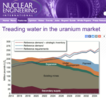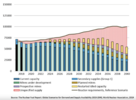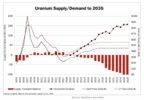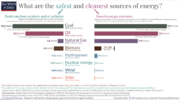nergy for the Next Billion Years
Sean Brodrick
Money and Markets
April 19th, 2006
Now that China and Australia have signed a landmark agreement on uranium, where do we go from here?
Further than most men can dream!
This one uranium deal is part of a much larger trade package between the two countries. And it's just the first deal of many.
Heck, signing the deal was quick and easy. Overcoming today's acute shortages of uranium is going to be slow and tough. In fact, Australia probably won't be actually shipping uranium ore to China until 2008, according to Aussie Resources Minister Ian Macfarlane.
"Australia is already fully committed in terms of uranium production through until about 2008, bearing in mind that the signing of this agreement means that this is really only the start of the process," he said. "From there we need to move forward."
In other words,
It's still very early in the game, and you can still get in close to the ground floor of Australia's uranium boom.
Here are just some of the things I see happening in the near - and not-so-near - future ...
A New Chinese "Gold" Rush in Australia?
Last week, I told you how Chinese miners came to Australia in the 1800s for the great gold rush. Now, it's going to happen again, but on a far greater scale.
This time, instead of laborers, they will be investors. Instead of individuals, you will see the advent of big, highly capitalized companies.
And this time, instead of a rush into gold, the Chinese will be scrambling after the stocks of varied Australian resource companies, especially uranium explorers.
Never forget: Australia sits on between 30% and 40% of the world's known uranium resources.
And the Chinese have been actively on the prowl for foreign natural resource companies.
Outside of U.S. Treasuries, do you know where China has been putting most of its overseas investments?
Not in Japan or Thailand or anywhere in Asia. It's Latin America. Why? For two reasons:
First, because China is so utterly committed to buying up available resources of copper, nickel and more.
And second, because natural resources in Australia, despite its relative proximity to China, were mostly out of reach ... until now, that is.
Until the recent agreement was signed, Australia was not able to export its uranium resources to China. Now, with the new agreement in place, they're likely to start playing catch-up, driving the revenues, profits and shares of Australian mining companies through the roof.
Uranium mines are the first targets. But once they've got those secured, you can bet Chinese companies will be giving other Australian resources companies the once over as well - copper, gold, nickel, zinc and more. So don't be surprised if this lights a fire under other undervalued Australian miners in a big hurry.
A New Political Wind Is Blowing
The Labor Party in Australia has a history of being anti-nuke.
So when it ran the Federal government, it maintained a very restrictive "Three Mines Policy" - only three uranium mines allowed to be open at a time.
Now, Labor has long been out of power on the Federal level with the federal law already in the dustbin of history.
Labor still governs in three potentially important Australian states - Western Australia, South Australia and Queensland - but even there, anti-nuke sentiment is beginning to waver.
Already, South Australian Premier Mike Rann and Labor's resources spokesman Martin Ferguson have both expressed the view that the Three Mines Policy needs to be overhauled.
And already, a major force is pushing Australia's Labor party to back off from its anti-nuke platform: Labor itself!
You see, mine workers make very good money. A pipe fitter at the Olympic Dam mine (a copper-uranium mine owned by BHP) can make (AUS) $80,000 a year. So if Labor is indeed the party of labor, it's going to come around to what workers care about most - providing a good living for their families - and it will give its old policy the boot.
That not-so-subtle change will shift Australia's mines into overdrive.
Backdoor Sales to India Could Dramatically Boost Uranium Demand
Officially speaking, Australian uranium sales to India are taboo because India has failed to sign the Nuclear Non-Proliferation Treaty (NPT). But I suspect India's demand for uranium will be so intense ... and Australia's ability to supply it will be so critical ... even the NPT is a hurdle that's likely to be overcome in one way or another.
Here's the NPT deal in a nutshell:
(A) The Big Five nuclear powers - the U.S., Britain, France, Russia and China - got official recognition as established nuke countries. But they agreed to negotiate in good faith toward disarmament.
(B) In exchange, the non-nuclear states promised not to develop their own nuclear weapons. But they got the right to buy nuclear technology for power generation.
OK. That works ... provided no one cheats or tries an end run.
Problem: More and more countries are doing both.
Lo and behold, two Australian uranium producers recently struck deals to sell uranium to a Taiwanese electricity company. And guess what: Taiwan is not a signatory to the NPT. It used to be, but no longer is recognized as a sovereign state with a valid signature.
How are the companies getting around this hurdle? By selling to the U.S., which will then sell to Taiwan.
And hey - didn't President Bush just promise a nuclear technology deal with India?
Why, yes he did! The administration wants to woo India away from Iran and to accelerate India's rise as a regional counterweight to China.
And hey - didn't President Bush just promise a nuclear technology deal with India? Why, yes he did! The administration wants to woo India away from Iran and to accelerate India's rise as a regional counterweight to China.
Sean Brodrick
Money and Markets
April 19th, 2006
Now that China and Australia have signed a landmark agreement on uranium, where do we go from here?
Further than most men can dream!
This one uranium deal is part of a much larger trade package between the two countries. And it's just the first deal of many.
Heck, signing the deal was quick and easy. Overcoming today's acute shortages of uranium is going to be slow and tough. In fact, Australia probably won't be actually shipping uranium ore to China until 2008, according to Aussie Resources Minister Ian Macfarlane.
"Australia is already fully committed in terms of uranium production through until about 2008, bearing in mind that the signing of this agreement means that this is really only the start of the process," he said. "From there we need to move forward."
In other words,
It's still very early in the game, and you can still get in close to the ground floor of Australia's uranium boom.
Here are just some of the things I see happening in the near - and not-so-near - future ...
A New Chinese "Gold" Rush in Australia?
Last week, I told you how Chinese miners came to Australia in the 1800s for the great gold rush. Now, it's going to happen again, but on a far greater scale.
This time, instead of laborers, they will be investors. Instead of individuals, you will see the advent of big, highly capitalized companies.
And this time, instead of a rush into gold, the Chinese will be scrambling after the stocks of varied Australian resource companies, especially uranium explorers.
Never forget: Australia sits on between 30% and 40% of the world's known uranium resources.
And the Chinese have been actively on the prowl for foreign natural resource companies.
Outside of U.S. Treasuries, do you know where China has been putting most of its overseas investments?
Not in Japan or Thailand or anywhere in Asia. It's Latin America. Why? For two reasons:
First, because China is so utterly committed to buying up available resources of copper, nickel and more.
And second, because natural resources in Australia, despite its relative proximity to China, were mostly out of reach ... until now, that is.
Until the recent agreement was signed, Australia was not able to export its uranium resources to China. Now, with the new agreement in place, they're likely to start playing catch-up, driving the revenues, profits and shares of Australian mining companies through the roof.
Uranium mines are the first targets. But once they've got those secured, you can bet Chinese companies will be giving other Australian resources companies the once over as well - copper, gold, nickel, zinc and more. So don't be surprised if this lights a fire under other undervalued Australian miners in a big hurry.
A New Political Wind Is Blowing
The Labor Party in Australia has a history of being anti-nuke.
So when it ran the Federal government, it maintained a very restrictive "Three Mines Policy" - only three uranium mines allowed to be open at a time.
Now, Labor has long been out of power on the Federal level with the federal law already in the dustbin of history.
Labor still governs in three potentially important Australian states - Western Australia, South Australia and Queensland - but even there, anti-nuke sentiment is beginning to waver.
Already, South Australian Premier Mike Rann and Labor's resources spokesman Martin Ferguson have both expressed the view that the Three Mines Policy needs to be overhauled.
And already, a major force is pushing Australia's Labor party to back off from its anti-nuke platform: Labor itself!
You see, mine workers make very good money. A pipe fitter at the Olympic Dam mine (a copper-uranium mine owned by BHP) can make (AUS) $80,000 a year. So if Labor is indeed the party of labor, it's going to come around to what workers care about most - providing a good living for their families - and it will give its old policy the boot.
That not-so-subtle change will shift Australia's mines into overdrive.
Backdoor Sales to India Could Dramatically Boost Uranium Demand
Officially speaking, Australian uranium sales to India are taboo because India has failed to sign the Nuclear Non-Proliferation Treaty (NPT). But I suspect India's demand for uranium will be so intense ... and Australia's ability to supply it will be so critical ... even the NPT is a hurdle that's likely to be overcome in one way or another.
Here's the NPT deal in a nutshell:
(A) The Big Five nuclear powers - the U.S., Britain, France, Russia and China - got official recognition as established nuke countries. But they agreed to negotiate in good faith toward disarmament.
(B) In exchange, the non-nuclear states promised not to develop their own nuclear weapons. But they got the right to buy nuclear technology for power generation.
OK. That works ... provided no one cheats or tries an end run.
Problem: More and more countries are doing both.
Lo and behold, two Australian uranium producers recently struck deals to sell uranium to a Taiwanese electricity company. And guess what: Taiwan is not a signatory to the NPT. It used to be, but no longer is recognized as a sovereign state with a valid signature.
How are the companies getting around this hurdle? By selling to the U.S., which will then sell to Taiwan.
And hey - didn't President Bush just promise a nuclear technology deal with India?
Why, yes he did! The administration wants to woo India away from Iran and to accelerate India's rise as a regional counterweight to China.
And hey - didn't President Bush just promise a nuclear technology deal with India? Why, yes he did! The administration wants to woo India away from Iran and to accelerate India's rise as a regional counterweight to China.










